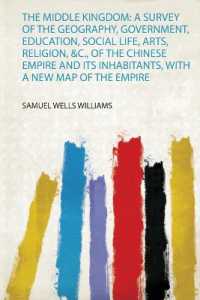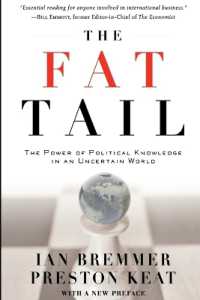Full Description
Combining detailed coverage of the writing process with a wealth of professional readings, Wyrick's STEPS TO WRITING WELL WITH ADDITIONAL READINGS has helped thousands of students learn to write effective academic essays. Extremely student-friendly, it presents rhetorical strategies for composing essays in an easy-to-follow progression of useful lessons and activities. With over 70 student and professional readings and a variety of hands-on activities, it gives you the models and practice you need to write well-constructed essays with confidence. The 11th edition features useful visual learning aids, student writing samples on timely topics, assignments that promote using sources and multiple rhetorical strategies, and updated discussions of multimodal texts and online databases. It also reflects guidelines from the APA's 2020 Publication Manual. Now available: MindTap digital learning solution.
Contents
Part I: THE BASICS OF THE SHORT ESSAY.
1. Prewriting.
Getting Started. Selecting a Subject. Finding Your Essay's Purpose and Focus. Pump-Primer Techniques. After Youve Found Your Focus. Practicing What You've Learned. Discovering Your Audience. How to Identify Your Readers. Practicing What You've Learned. Assignment. Keeping a Journal (Talking to Yourself Does Help). Chapter 1 Summary.
2. The Thesis Statement.
What Is a Thesis? What Does a Working Thesis Do? Can a Working Thesis Change Guidelines for Writing a Good Thesis. Avoiding Common Errors in Thesis Statements. Practicing What You've Learned. Assignment. Using the Essay Map. Practicing What You've Learned. Assignment. Chapter 2 Summary.
3. The Body Paragraphs.
Planning the Body of Your Essay. Composing the Body Paragraphs. The Topic Sentence. Focusing Your Topic Sentence. Placing Your Topic Sentence. Practicing What You've Learned. Assignment. Applying What You've Learned to Your Writing. Paragraph Development. Paragraph Length. Practicing What You've Learned. Assignment. Applying What You've Learned to Your Writing. Paragraph Unity. Practicing What You've Learned. Applying What You've Learned to Your Writing. Paragraph Coherence. Practicing What You've Learned. Paragraph Sequence. Transitions between Paragraphs. Applying What You've Learned to Your Writing. Chapter 3 Summary.
4. Beginnings and Endings.
How to Write a Good Lead-In. Avoiding Errors in Lead-Ins. Practicing What You've Learned. Assignment. How to Write a Good Concluding Paragraph. Avoiding Errors in Conclusions. Practicing What You've Learned. Assignment. How to Write a Good Title. Practicing What You've Learned. Assignment. Applying What You've Learned to Your Writing. Chapter 4 Summary.
5. Drafting and Revising: Creative Thinking, Critical Thinking.
What Is Revision? When Does Revision Occur? Myths about Revision. Can I Learn to Improve My Revision Skills? Preparing to Draft. Some Basic Tips for Drafting. Some Hints When Drafting on a Computer. Some Hints When Handwriting a Draft. Writing Centers, Computer Classrooms, and Electronic Networks. Procrastination: Enemy of Critical Thinking, Thief of Time. I. Revising for Purpose, Thesis, and Audience. II. Revising for Ideas and Evidence. What Is Critical Thinking? Thinking Critically as a Writer. Critical Thinking and Visual Literacy. III. Revising for Organization. IV. Revising for Clarity and Style. V. Editing for Errors. VI. Proofreading. A Final Checklist for Your Essay. Sample Student Essay: The Fear No One Talks About. Practicing What You've Learned. Assignment. Applying What You've Learned to Your Writing. Collaborative Activities: Group Work, Peer Revision Workshops, and Team Projects. Benefiting from Collaborative Activities. Guidelines for Peer Revision Workshops. Guidelines for Small-Group Work. Practicing What You've Learned. Assignment. Some Last Advice: How to Play with Your Mental Blocks. Chapter 5 Summary.
6. Effective Sentences.
Developing a Clear Style. Practicing What You've Learned. Developing a Concise Style. Practicing What You've Learned. Assignment. Developing an Engaging Style. Practicing What You've Learned. Assignment. Developing an Emphatic Style. Practicing What You've Learned. Assignment. Applying What You've Learned to Your Writing. Chapter 6 Summary.
7. Word Logic.
Selecting the Correct Words. Practicing What You've Learned. Selecting the Best Words. Practicing What You've Learned. Assignment. Applying What You've Learned to Your Writing. Chapter 7 Summary.
8. The Reading-Writing Connection.
How Can Reading Well Help Me Become a Better Writer? How Can I Become an Analytical Reader? Steps to Reading Well. Sample Annotated Essay: College for Grown-Ups.? Practicing What You've Learned. Assignment. How Can I Read Multimodal Texts Analytically? Steps to Reading Multimodal Texts Well. Sample Annotated Advertisement. Writing a Summary. Practicing What You've Learned. Benefiting from Class Discussion. Practicing What You've Learned. Ch








